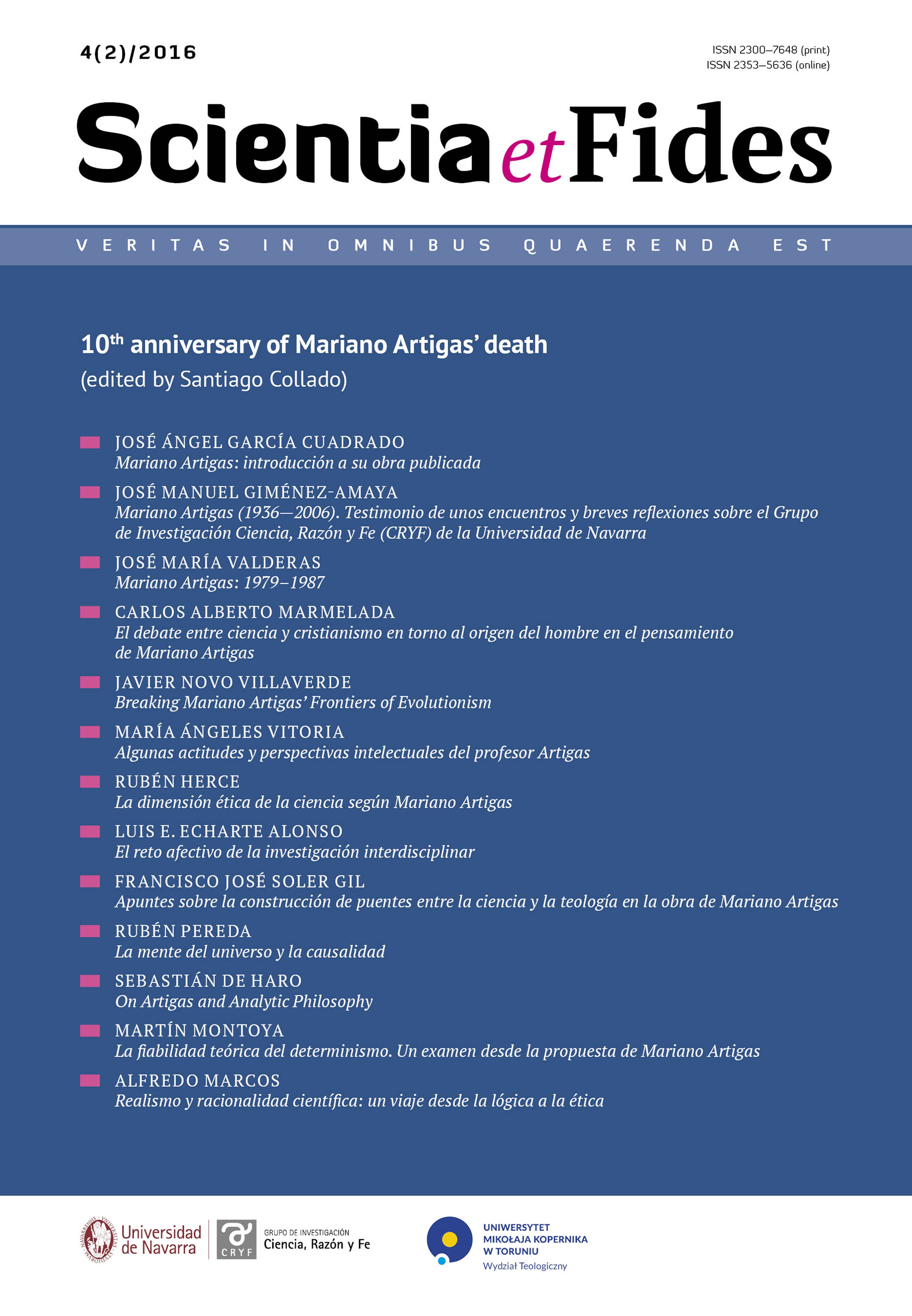El debate entre ciencia y cristianismo en torno al origen del hombre en el pensamiento de Mariano Artigas
Keywords
Science, creation, God, Darwinism, purpose, man, divine plan, theory of evolutionAbstract
The debate between science and Christianity about the origin of man in the thought of Mariano Artigas
One of the main intelectual concerns of Professor Artigas was to make clear the relationships between science and faith in bordering fields such as the nature and the origin of mankind. At this point, there are some researchers who have seen in science the intelectual basement of nowadays unbelief, the legitimous basement of modern atheism, which would find support in the objectivity of the scientific knowledge; especially the evolution theory, which would have been useful, from Darwin’s times, to prove that it was legitimate intelectually speaking to be an atheist. I mean, science would have made useless the hypothesis of the existence of God. Artigas dedicated a lot of extensive essays to refute this modern affirmation, explaining how the terms of evolution and creation are not opposite, and how the existence of chance in nature doesn´t deny the theology through the action of a divine plan, in a way that there’s no contradiction in reassure a biological origin for mankind with the existence of espiritual faculties which lead to transcendency. Once reported the ideologic manipulation of the theory of evolution for spurious objectives, Artigas deals with the same honesty and braveness the complicated questions of monogenism and poligenism. Our brief article presents a concise review on the development of all these questions based on his thoughts.
References
Aristóteles. 1982. Metafísica. Madrid: Gredos.
Artigas, Mariano. 1992a. La inteligibilidad de la Naturaleza. Pamplona: Eunsa.
Artigas, Mariano. 1992b. El hombre a la luz de la ciencia. Madrid: Palabra.
Artigas, Mariano. 1992c. Las fronteras del evolucionismo. Madrid: Palabra.
Artigas, Mariano. 2007. Ciencia y religión. Conceptos fundamentales. Pamplona: Eunsa.
Artigas, M.. R. Martínez, F. L. Mateo-Seco, & W. R. Shea. 2001. “Un inedito sul caso Galilei.” Acta Philosophica 10:197-272.
Artigas, M., R. Martínez, y W. R. Shea. 2003. “Nueva luz en el caso Galileo.” Anuario de Historia de la Iglesia 12:159-179.
Artigas, M. y D. Turbón. 2008. Origen del hombre. Ciencia, filosofía y religión. Pamplona: Eunsa.
Benedicto XVI. 2005. Homilía del 24 de abril. Disponible en: https://w2.vatican.va/content/benedict-xvi/es/homilies/2005/documents/hf_ben-xvi_hom_20050424_inizio-pontificato.html
Heidegger, Martin. 1986. Kant y el problema de la Metafísica. México: FCE.
Heidegger, Martin. 1989. Conceptos fundamentales. Madrid: Alianza Editorial.
Juan Pablo II. 1986. Audiencia general: El hombre, imagen de Dios, un ser espiritual y corporal. 16 de abril. Insegnamenti IX, 1: 1041. Disponible en https://w2.vatican.va/content/john-paul-ii/es/audiences/1986/documents/hf_jp-ii_aud_19860416.html
Juan Pablo II. 1996. “Mensaje a la Academia Pontificia de Ciencias.”, 22 de octubre. Disponible en http://w2.vatican.va/content/john-paul-ii/es/messages/pont_messages/1996/documents/hf_jp-ii_mes_19961022_evoluzione.html
Martínez, R. 2007. “El Vaticano y la evolución. La recepción del darwinismo en el Archivo del Índice.” Scripta Theologica 39:529-549.
Nietzsche, W. F. 1987. La genealogía de la moral. Madrid: Alianza Editorial.
Pío XII. 1950. Carta encíclica Humani generis. Disponible en http://w2.vatican.va/content/pius-xii/es/encyclicals/documents/hf_p-xii_enc_12081950_humani-generis.html
Ratzinger, J. 2005. Creación y pecado. Pamplona: Eunsa.
Downloads
Published
How to Cite
Issue
Section
License
CC BY ND 4.0. The Creator/Contributor is the Licensor, who grants the Licensee a non-exclusive license to use the Work on the fields indicated in the License Agreement.
- The Licensor grants the Licensee a non-exclusive license to use the Work/related rights item specified in § 1 within the following fields: a) recording of Work/related rights item; b) reproduction (multiplication) of Work/related rights item in print and digital technology (e-book, audiobook); c) placing the copies of the multiplied Work/related rights item on the market; d) entering the Work/related rights item to computer memory; e) distribution of the work in electronic version in the open access form on the basis of Creative Commons license (CC BY-ND 3.0) via the digital platform of the Nicolaus Copernicus University Press and file repository of the Nicolaus Copernicus University.
- Usage of the recorded Work by the Licensee within the above fields is not restricted by time, numbers or territory.
- The Licensor grants the license for the Work/related rights item to the Licensee free of charge and for an unspecified period of time.
FULL TEXT License Agreement
Stats
Number of views and downloads: 1479
Number of citations: 0



